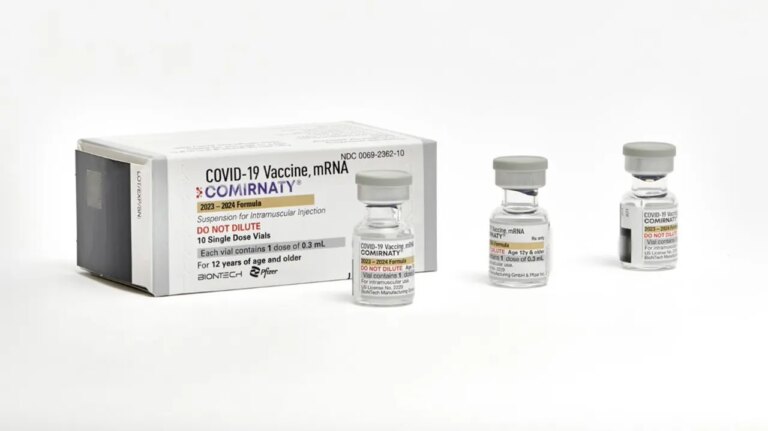New COVID-19 Shots Recommended for Most Americans
Health officials have advised that most Americans should get an updated COVID-19 vaccine, according to the Centers for Disease Control and Prevention (CDC). The CDC’s advisers endorsed these new shots for everyone aged 6 months and older, and the CDC’s director swiftly approved this recommendation. Consequently, these updated doses are expected to be available as early as this week, with some being distributed as soon as Wednesday.
While the COVID-19 pandemic has become less severe, the United States still witnesses hundreds of hospitalizations and deaths each week due to the virus. Hospitalizations have been on the rise since late summer, although recent data suggests that infections may be leveling off, especially in the South. However, experts express concerns about waning immunity from prior vaccinations and infections, emphasizing that these new shots could save lives.
A recent CDC-cited survey from last month revealed that about 42% of respondents would definitely or probably get the new vaccine. However, when offered an updated booster shot a year ago, only around 20% of adults took advantage of it.
Preventing a “Tripledemic”
Doctors hope that a sufficient number of people will choose to get vaccinated to prevent another “tripledemic” like the one experienced last year. During that time, hospitals were overwhelmed with an early flu season, an influx of respiratory syncytial virus (RSV) cases, and another surge of winter coronavirus infections.
Key Information about the Updated COVID-19 Shots
Who Should Get the Updated Vaccine?
The Food and Drug Administration (FDA) has approved the updated shots for adults and children as young as 6 months. Starting at age 5, most individuals can receive a single dose, even if they have not received a prior COVID-19 shot. Younger children may require additional doses depending on their history of COVID-19 infections and vaccinations.
The CDC determines how vaccines should be used and makes recommendations for U.S. doctors and the general public. The agency’s panel of outside experts recommended the updated COVID-19 shots by a vote of 13-1. The sole dissenting vote came from a panel member who argued that the new shots should initially be recommended only for older individuals and those at the highest risk of severe illness. However, other panel members emphasized that people of all ages could and should benefit from the new shots.
Where Can I Get a Shot?
The new vaccine will be available at pharmacies, health centers, and some doctor’s offices, with locations listed on the government’s vaccines.gov website. The list price of a dose of each shot is $120 to $130, but federal officials have stated that these new COVID-19 shots will still be free to most Americans through private insurance, Medicare, or Medicaid. For those who are uninsured or underinsured, the CDC is collaborating with health departments, clinics, and certain pharmacies to temporarily provide free shots.
On Tuesday, a Pfizer official mentioned that doses from his company would likely be available at some U.S. locations as early as Wednesday.
Why Are More COVID-19 Shots Necessary?
Similar to annual flu shots, the FDA provided COVID-19 vaccine manufacturers with an updated formula for this fall. These updated shots target a single variant, called XBB.1.5, which is a descendant of omicron. This is a significant change, as the COVID-19 vaccines offered since last year have been combination shots targeting the original coronavirus strain and an earlier omicron version, rendering them outdated. Pfizer, Moderna, and Novavax have all manufactured new supplies, with Pfizer and Moderna’s updated vaccines already approved by the FDA. Novavax’s updated vaccine is still under review.
Effectiveness of the New Shots
Health officials are cautiously optimistic about the new shots’ effectiveness, barring the emergence of a new variant. XBB.1.5 has gradually faded over the months it took to refine the vaccine. Currently, various coronavirus variants are causing illnesses, and the most common ones are closely related. Recent laboratory testing by vaccine makers and research groups suggests that the updated shots will provide cross-protection.
While earlier vaccinations or infections have continued to prevent severe disease and death, protection diminishes over time, especially against milder infections as the virus evolves. Last spring, the FDA did permit seniors and high-risk individuals to receive an additional booster dose, but most Americans have not been vaccinated in about a year.
Can I Get a Flu Shot and COVID-19 Shot at the Same Time?
Yes, the CDC states that there is no difference in effectiveness or side effects if individuals receive these vaccines simultaneously. However, receiving them in separate arms might be more comfortable. The CDC strongly recommends a yearly flu shot for nearly everyone aged 6 months and up, ideally by the end of October.

